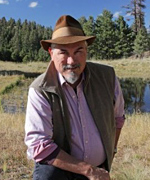 —Alan Dulaney
—Alan Dulaney
Salvo and counter-salvo; battle is joined and every interest is defending its own water. The wheels have come off the Arizona wagon of cooperation on water issues. The Drought Contingency Plan is dead.
The Governor’s water discussions in 2017 focused, in part, on the lack of State authority over programs that Central Arizona Water Conservation District (CAWCD) had already initiated on the Colorado River. When the Governor says that Arizona must speak with one voice, it is the Arizona Department of Water Resources (ADWR) he has in mind, not CAWCD. ADWR was floating a legislative proposal to gain the authority to forbear the use of Colorado River water that is not consumptively used by a contractor — a power now held by the CAWCD. This is also related to the issue of sovereign immunity, which CAWCD has claimed.
On March 29, the Arizona Legislative Council sent a memo to Senator Gail Griffin and Representative Rusty Bowers concerning the constitutionality of granting forbearance authority to ADWR. The Legislative Council said that introducing a new party into the contract between the U.S. and CAWCD would change the contractual authority of CAWCD to manage excess water (now broadly defined), and thus would violate the Contracts Clause of the Arizona Constitution. Forbearance is a major tool to control water level elevations in Lake Mead by controlling demand. CAWCD has run forbearance programs over the last few years that have apparently been successful, along with other programs, in preventing a declared shortage on the Colorado River, triggered by a fall in Lake Mead water level elevations below 1,075 ft. The memo seems to be a clear victory for CAWCD, which has hands-down won every encounter this legislative session.
On April 4, ADWR responded with its own legal memo countering the position of the Arizona Legislative Council. The memo says that the State has the sovereign right under the 1944 Contract to forbear delivery of the State’s Colorado River water conserved by Arizona contractors, and that exercising that right would not infringe on any contractual rights held by CAWCD. Nor has the Legislature delegated CAWCD, a municipal corporation, authority over Colorado River water or given up its own powers to amend statutes defining CAWCD responsibilities. CAWCD is not immune to state law. CAWCD is not sovereign.
This issue has agricultural interests across Arizona upset, especially in Yuma. CAWCD appears to be laying claim to all water in the Colorado River not ordered by a contractor as excess water. On March 23, in a packed “learning tour” meeting chaired by Griffin and Bowers, the two water leaders of the Legislature got an earful of comment from farmers about how CAWCD was coming for their water. ADWR also spoke. Most comments were tied to CAWCD’s claim of sovereign immunity, which in turn underlies its claim to sole authority over forbearance programs. Another such meeting is planned for April 27 in Safford.